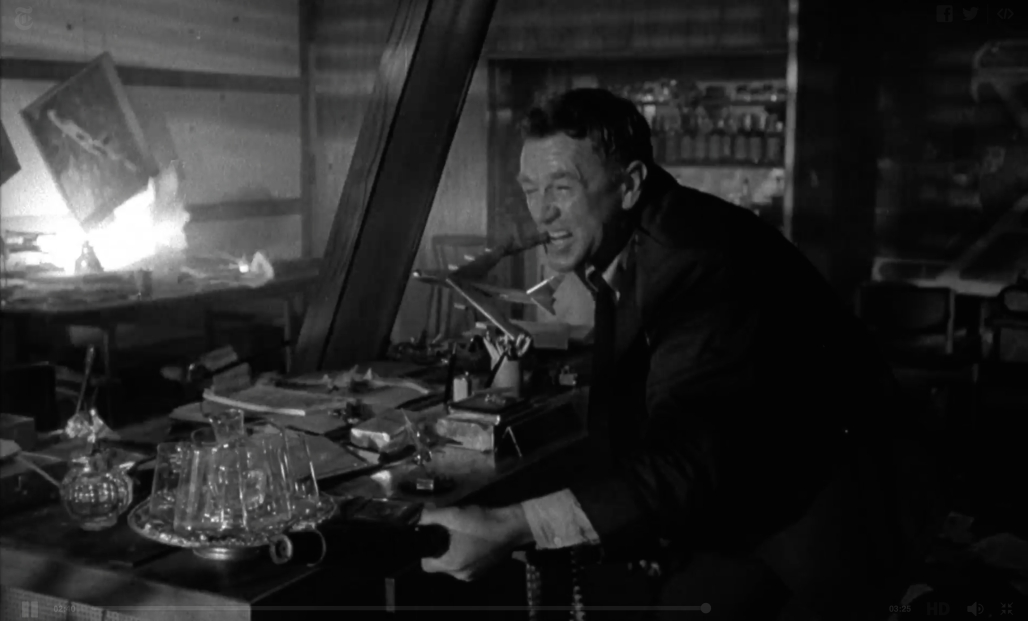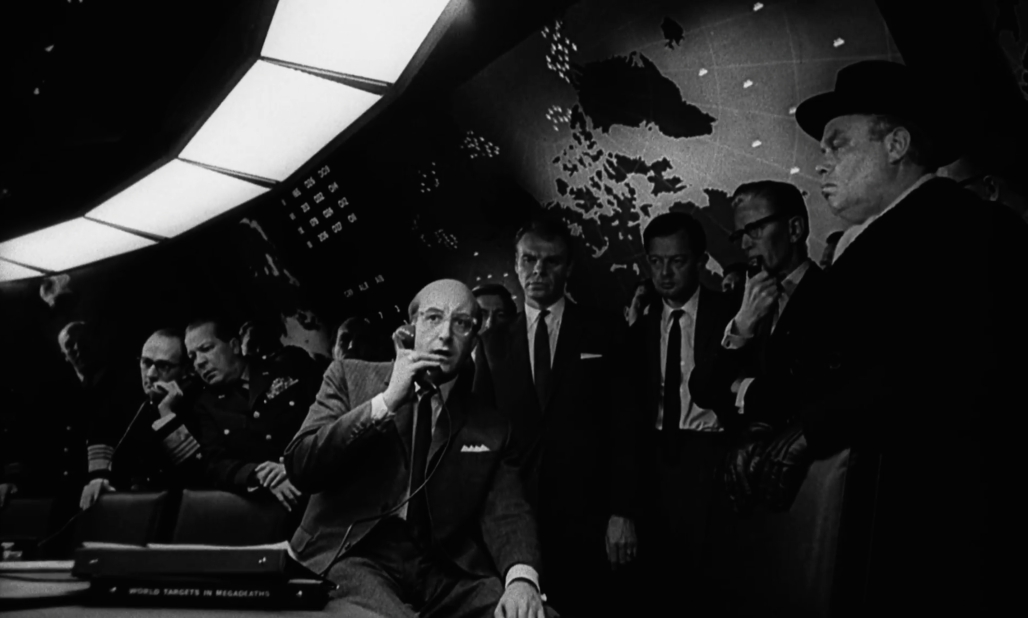I saw Dr. Strangelove for the first time in my mid-teens. This was the ’80s and my number one preoccupation in life was to not get blown up by a nuclear bomb. It was inevitable as far as I was concerned, the only question was when. The fear may not have been as palpable as, say, during the Cuban Missile Crisis, or during the years following, when the psychological terror of coming so close to nuclear winter was metastasizing into the permanent background of daily life. For me, it wasn’t the news so much as it was popular culture that stoked my nerves, buffeted as I was on all sides by the latent nuclear threat in movies like WarGames (1983) and Red Dawn (1984) and, especially indelible, the terrifying, too-close-to-home imagery of The Day After (1983). I was more than once thrown into a homework-defeating panic over being incinerated where I sat. Alongside that, quite salvific given my dark imagination, was my burgeoning love for comedy – Abbott & Costello gave way to the Marx Brothers, Mel Brooks gave way to Woody Allen, Jerry Lewis gave way to Jacques Tati, and all of it cinched together with the constant drumbeat of nose-thumbing meta-media like SNL, Letterman, Mad Magazine, and Looney Tunes, all of which encouraged the embracing of an already-sarcastic approach to culture and authority. Into this mix of legit fear and un-won adolescent mockery came Dr. Strangelove… and it was the greatest, most sophisticated, out-of-reach piece of art I’d ever laid eyes on.

I’m clearly not alone. It’s the perfect comedy, as agreed upon by the readers of this very site in their Comedy Countdown back in 2012, and as honored at that time by a typically comprehensive, surgical essay written by Roderick Heath, an essay that practically negates the need for another word to be written about it. (Yet here I am.) Needless to say, if there’s anyone wanting an encyclopedic, end-all-need examination of the film, please refer to his titanic essay.
As for what follows, it’s all been covered before, cause how could it not, but the observations below are the simple, perfect nuts and bolts of the thing that have kept me enamored of it for decades. Kubrick siphoned comedy up from the depths of a quite serious source book (Peter George’s Red Alert), then restrained the comedy by scrapping an already filmed over-the-top pie fight in the War Room. In between these two major tonal adjustments, resting perfectly on the pinpoint nexus of dark and funny, is where the movie lives. We know it’s serious because of what the characters are saying; we know it’s funny because of how they’re saying it: the most internationally destabilizing act possible, instigated by a gone-mad Air Force general, alongside all of the commentary on that act, by the men whose job it is to keep it from happening at all costs and then clean it up if it does, must be believed because of the dry authority behind it, but cannot be believed because the implications mean the destruction of all life on earth.

Among the film’s chief accomplishments for me is that Kubrick and writer Terry Southern (reworking a script by Kubrick and George) incorporate almost every kind of comedy to serve its ends: It PARODIES the by-then well-established political/military procedural, slickly epitomized by concurrent dramas like The Best Man, Advise & Consent, The Manchurian Candidate – and, presciently acts as the perfect send-up of its serio-heady doppelgänger, Fail-Safe, which was out later the same year (and was based on a book so similar to Red Alert, that George sued for plagiarism). One wonders if Kubrick, beyond simply divining the absurd guts deep inside George’s book, and ever the obsessive micro-manager, saw Fail-Safe looming and changed his tack to up-end any likely comparisons. In any case, it’s as much a parody of that brand of movie, with its detailed focus on the minutia of political and military hubris, as Airplane! is a parody of the Airport series that spanned the decade before it, and, more generally, the by-then prominent, if already moribund, star-studded disaster movie. Strangelove also lays the foundation for Airplane!'s style of verbal delivery, which relies for its laughs on the actor’s ability to maintain an air of deadly seriousness while uttering the most absurd lines of their career. But whereas a movie like Airplane! is an example of a pure parody, it could never be accused of SATIRIZING anything, which Strangelove most assuredly does. It would be a stretch to say the Zuckers and Abrahams set out to skewer the airline industry for its incompetence and institutionalized malfeasance. No, they were going for laughs alone. Dr. Strangelove, on the other hand, goes for laughs riffing on our understanding of political dramas as taught to us by the ones surrounding it, while also taking direct aim at the evil that lurks within the very construct of government, national security, and the political philosophy that cries “Fight fire with fear of fire!” Then, as if to short-circuit any accusation of pomposity, the movie also employs ample WORDPLAY – it’s wall-to-wall quotable, withdetailed specificity running alongside clever turns of phrase and on-the-nosecharacter names, all working like separate EQ knobs on a mixing board until the combination is harmonious – and finally, like a cherry on top, there’s a steady dose of PHYSICAL HUMOR, from Turgidson’s tumbling pratfall, to spritzing soda in Guano’s face, to, yes, fighting in the War Room.

However, from Rod’s essay, a tidbit: “One aspect vital to appreciating Dr. Strangelove is the degree to which it is not a comedy at all.” Of course, it’s like plucking a verse out of holy writ to make your own lesser point, a sacrilege in any case. But I’m evoking it for the most humble of admissions: that I don’t really understand why Dr. Strangelove is on this list at all. I leapt upon it during the dog-pile phase of title assignments because I love it so much, and I looked forward to writing something about my personal experience with it. That is, until I was hit by the gut-punch of my own ignorance re: its genre elasticity. Though it’s not often thought of as a science-fiction movie, this list and many sources seem quite content to place it in that genre. I simply have difficulty making the leap. Imagine my surprise when, in my online hunting and pecking, I discovered film received from the World Science Fiction Society a Hugo Award for Dramatic Presentation in 1965, its legitimacy pronounced by its being surrounded on the chronological list by a clutch of Twilight Zones and Star Treks. I can see the reasoning: the movie deals with the resultant mayhem so predictable anytime man tries to wrangle huge advances in technology inside the structure of ages old institutions, full as they are of hubris, inertia, and corruptible men. It also, though forced, can fit itself into the sub-sci-fi, disaster/ apocalypse genre. The way I accept that one is by thinking of the film as a prequel to a post-apocalyptic movie. When the final sequence of a film is a montage of actual nuclear explosions, one does not have to strain to imagine how these same characters, or at least the ones that might survive, would manage in the new paradigm. But as for me, I’m willing, if anyone wants to join me, to forget labels at all, and simply view the movie as a love letter from a few darkly funny men to the world, one that says, “Well, here we are, this is apparently how we are, and this is apparently how we end… but how ’bout a little laugh before we shuffle off this mortal coil.”

A final obvious point still worth celebrating: there isn’t a flawed performance in the movie, and one actor in particular had three chances to fail. Peter Sellers completely manifests three different energies within the movie – embodying, as they loosely do, the id (barely-contained Dr. Strangelove), the ego (equilibrium-obsessed Pres. Muffley), and the superego (idle-until-guilting Capt. Mandrake) of all of humanity, each playing out their part in this ultimate laboratory test of human maturity under pressure. But while Sellers is beyond perfect in each of his three roles, I think the highest-wire achievements belong to Sterling Hayden – who must somehow believe every word of his own outrageous, fluid-based self-justification – and George C. Scott – who must somehow believe every one of his pouty, hyper, arm-flapping, tumbling physical expressions. Together, the verbal and the physical, along with Kubrick’s slide-rule visual perfection, are absorbed into the dark and the funny, a cook so pure that it distracts us until the very end from the ultimate dark realization: there’s little chance that scrawny humanity, with its twin passions of technology and war, will successfully avoid getting its hair permanently mussed.

No comments:
Post a Comment